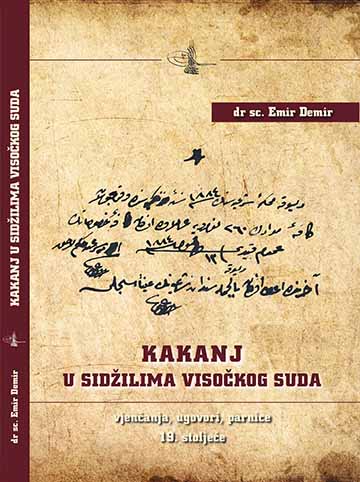Kakanj u sidžilima Visočkog suda : vjenčanja, ugovori, parnice 19. stoljeće
KAKANJ IN THE REGISTERS OF VISOKO COURT: MARRIAGES, CONTRACTS, AND LITIGATIONS IN THE 19TH CENTURY
Author(s): Emir Demir
Subject(s): History, Law, Constitution, Jurisprudence, History of Law, Civil Law, The Ottoman Empire, Sharia Law
Published by: Fondacija za podršku naučnoistraživačkom radu I obrazovanju “Spektrum” Sarajevo
Keywords: Kakanj; Court of Visoko registers; census register; marriages; contracts; litigations; Ottoman period; Austro-Hungarian period; migrations; Visočka Nahija; archival material; Sharia and civil courts;
Summary/Abstract: This research follows the publication of the 1850 Census Register for the municipality of Kakanj and the book The Population of Kakanj in the Ottoman Period. The 19th century was a pivotal period marked by ethnic and national transformations, industrialization, migrations, and the emergence of a new world order. Reforms within the Ottoman Empire, including the abolition of the timar system and the 1858 Land Code, stimulated economic activity and migration.The primary aim of this study is to present information about the ancestors and social relations of Kakanj’s inhabitants based on court records. Only about twenty years' worth of judicial records from this period have been preserved, covering the territories of the Visočka Nahija, Breza, Vareš, Ilijaš, and Kiseljak. During the Ottoman and Austro-Hungarian periods, present-day Kakanj was under the jurisdiction of the Court of Visoko. These records are housed in the archives of Sarajevo and Visoko, although many documents are missing.In the Ottoman period, court records included both Muslim and non-Muslim populations, whereas during the Austro-Hungarian period, separate Sharia and civil courts existed. This study includes an index of surnames to facilitate data accessibility. The sources used in this research encompass sidžils (court registers) and judicial protocols from both the Ottoman and Austro-Hungarian periods.Although partial, this research provides significant insights into the historical aspects of Kakanj’s population, highlighting the importance of preserving court records as sources for future generations. It contributes to a deeper understanding of Kakanj’s local history and identity, emphasizing the value of archival material and professional support in historical research. The authors express hope for further processing and translation of the remaining archival documents. This book serves as a valuable resource for the study of the past and the genesis of identity.
- Print-ISBN-13: 978-9926-8546-1-4
- Page Count: 205
- Publication Year: 2021
- Language: Bosnian
- eBook-PDF
- Introduction
- Table of Content

